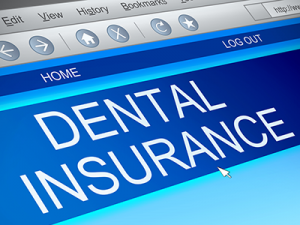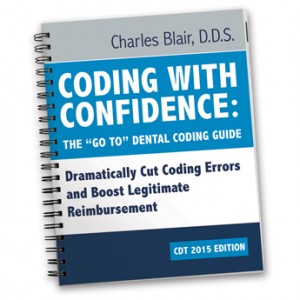 What evaluation code would you use in the scenario below?
What evaluation code would you use in the scenario below?
Mrs. Jones is a new patient scheduled at your practice and has completed/submitted her medical and dental health history forms. The Dentist reviews the forms and notices that Mrs. Jones is a smoker; it has also been one year since her last dental visit.
As you may be aware, smokers are more likely than nonsmoker to have the following:
- Calculus
- Bulbous gingival
- Blanched colored gingival
- Loss of alveolar bone and recession
What code would you use, based on the information below to bill out for the new patient evaluation?
According to the American Academy of Periodontology smoking is one of the risk factors associated with periodontal disease. In knowing this the general dentist determined that the D0180, comprehensive periodontal evaluation code, is to be billed out for the new patient evalution due to the smoking risk factor. The use of the D0180 Code in this case is appropriate.
D0180 Comprehensive Periodontal Evaluation – New or Established Patient: This procedure is indicated for patients showing signs or symptoms of periodontal disease and for patients with risk factors such as smoking or diabetes. It includes evaluation of periodontal conditions, probing and charting, evaluation and recording of the patient’s dental and medical history and general health assessment. It may include the evaluation and recording of dental caries, missing or unerrupted teeth, restorations, occlusal relationships and oral cancer evaluation.
The application of the CDT code D0180 may also be used in the presence of signs/symptoms of periodontal disease, history of periodontal disease or other risk factors such as diabetes. The rationale for using the D0180 code is that the comprehensive periodontal evaluation not only is an additional component that is not covered under D0120, but also takes a longer time to complete. Most offices attach a higher fee to D0180 because of the extra time needed to conduct a full-mouth, six-point probing and recording for all teeth plus charting of recession, mobility, exudate, etc.
D0120 Periodic Oral Evaluation – Established Patient: An evaluation performed on a patient of record to determine any changes in the patient’s dental and medical health status since a previous comprehensive or periodic evaluation. This includes an oral cancer evaluation and periodontal screening, where indicated, and may require interpretation of information acquired through additional diagnostic procedures.
According to the D0180 code description, the following apply:
- The D0180 code can be used in general or periodontal offices, as it is not specialty specific. However, it can only billed out annually along with a complete periodontal evaluation.
- The D0180 code can also be used on established patients who have risk factors and have periodontal disease requiring a comprehensive periodontal evaluation annually.
- Code D0180 and Code D0120 (routine evaluation) can alternate for when a full-mouth periodontal charting is performed once a year. In other words, If the hygienist performed a full-mouth probing/charting on a patient who is periodontal compromised , the appropriate exam code would be D0180 to reflect that service. The succeeding alternating exam would be coded D0120 to reflect an exam without a full-mouth periodontal evaluation.
- Can be used for either a new or established patient. If a new patient has signs or symptoms of periodontal disease, it may be preferable to use this code rather than D0150 (Comprehensive Oral Evaluation), as the D0180 includes all elements of a comprehensive restorative and periodontal exam.
- It would be inappropriate to report both D0150 and D0180 on the same visit.
- It would not be appropriate to use D0180 if only a PSR is performed, as PSR is a component of the D0120 exam.
- Also, if the patient has risk factors such as smoking or diabetes, it is appropriate to use D0180. (According to the National Institutes of Health, smoking and/or diabetes are the two primary risk factors for periodontal disease).
- It is appropriate to charge a higher fee for D0180 because it takes additional time to perform a thorough periodontal evaluation with full charting . However, there is no mandate to charge a higher fee for D0180
D0150 could be used to describe the evaluation provided to Mrs. Jones; however, this alternative does not emphasize the concern for and attention to the potential for periodontal disease.
One of the most frequently asked questions is whether or not third-party payers will cover D0180. Our clients report that majority of the time the D0180 code is paid by third – party payers. However, few payers will down code the D0180 code to D0120 for reimbursement and a few will reimburse this code once per lifetime.
As you are already aware, the insurance companies are free to set all kinds of restrictions on payment. Yet, as dental professionals those restrictions do not preclude the dental professional from providing care that is at or above current accepted standards of care. The current standard of care is that every adult should receive a full periodontal evaluation annually. Dental practices are mandated by law to be completely honest and forthright in deciding which code fits the procedure, regardless of the restrictions insurance companies place on a patients dental plan.
Dr. Charles Blair’s book, Coding with Confidence: The “Go To” Dental Insurance Guide, is an invaluable resource for dental practices. This manual goes into detail regarding appropriate coding and nuances. It is a valuable resource for EVERY dental practice!

 Strategic Practice Solutions, LLC
Strategic Practice Solutions, LLC